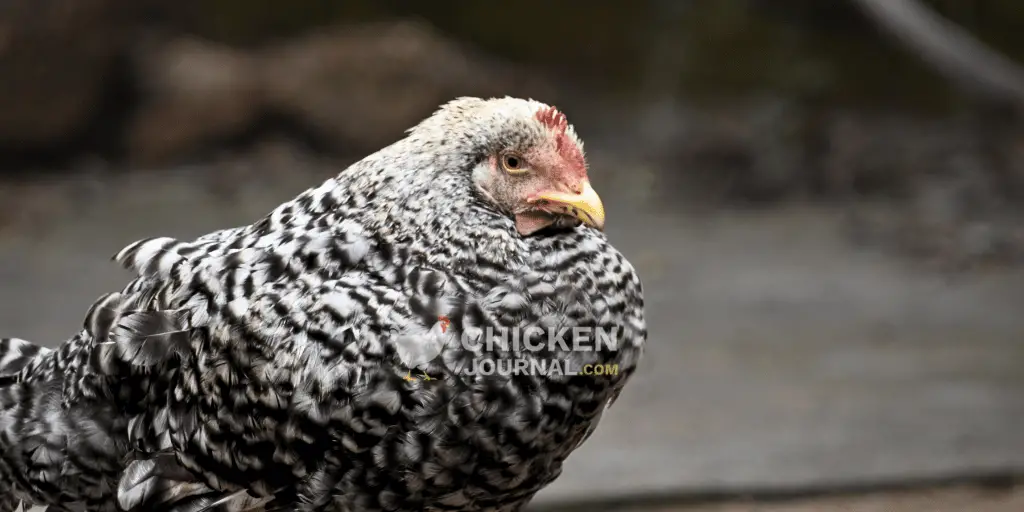
Stress in chickens is a common concern among poultry farmers and backyard chicken keepers. Like humans, chickens can experience stress from various sources, significantly impacting their health and productivity.
Understanding the types and causes of stress in chickens and implementing effective strategies to minimize stress is essential for maintaining the well-being of your flock.
In this comprehensive guide, you will learn about the different types of stress in chickens, their common causes, and the effects of stress on chicken health and productivity.
We will also discuss the signs and symptoms of stress in chickens, the impact of environmental factors on chicken stress levels, and the preventative measures you can take to minimize stress in your flock.
By the end of this guide, you will better understand stress in chickens and how to manage it effectively, ensuring your poultry birds’ well-being and stress reduction.
Types of Stress in Chickens
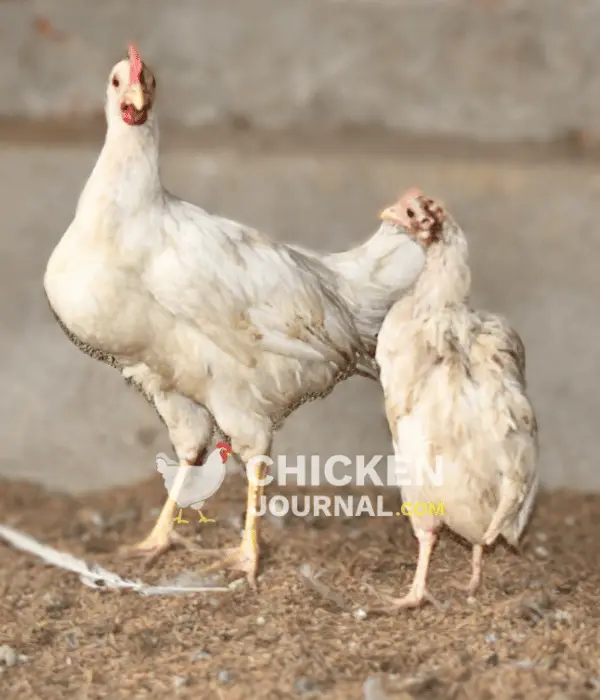
Below are a few common types of stress in chickens:
Heat Stress
Heat stress in chickens is common, especially during hot summer months. Chickens are sensitive to high temperatures and can experience heat stress when their bodies cannot effectively dissipate heat.
This can lead to dehydration, reduced egg production, and even death in severe cases. Heat stress in chickens is mainly seen in tropical regions of the earth.
Also read: How to keep chickens cool in Summer?
Also read: Best chicken coop ventilation ideas
Physical Stress
Various factors, such as injuries, overcrowding, and poor nutrition, can cause physical stress in chickens. Chickens require adequate space to move around and perch comfortably and need a balanced diet to maintain optimal health.
Inadequate living conditions and poor nutrition can lead to physical stress and a decline in overall health. Every poultry farmer must know the space required for their flocks. Different chicken breeds and flock number needs different space.
Also read: How much space do chickens need?
Environmental Stress
Environmental stress in chickens is caused by noise, light, and air quality. Chickens have sensitive hearing and can be stressed by loud noises or sudden changes in sound levels.
Additionally, chickens require a certain amount of daylight and darkness for optimal health, and disruptions to their natural light cycle can cause stress.
Poor air quality or rapid temperature changes can also contribute to environmental stress in chickens. You should make your chicken coops in calm areas.
So that roosters and hens live without stress. A calm and quiet space makes them happy, which helps them to mate and lay eggs.
Heat Stress Vs. Other Stress in Chickens
Below is a table showing the typical difference between heat stress and other stress in chickens:
| Heat Stress | Other Stress |
| Caused by high temperatures and inability to dissipate heat | Caused by various factors such as noise, light, air quality, overcrowding, and poor nutrition |
| This can lead to dehydration, reduced egg production, and death | This can lead to physical and mental health issues, reduced productivity, and increased susceptibility to disease |
| More common during the hot summer months | It can occur throughout the year |
| Preventable through proper ventilation, shade, and providing cool water | Preventable through proper living conditions, nutrition, and environmental management |
Most Common Causes of Stress in Chickens
Below are the most common causes of stress in chickens:
Nutritional Deficiencies
A balanced diet is essential for maintaining optimal health in chickens. Nutritional deficiencies can cause stress and negatively impact overall health and productivity.
You must understand the correct feeding method to keep your chickens healthy and stress-free.
Predators
The presence of predators, such as foxes, raccoons, or birds of prey, can cause stress in chickens.
Chickens may exhibit stress behaviors, such as refusing to leave the coop or roosting in trees to escape potential threats. Use a good quality standard and electric fencing to protect your chickens from predators.
Sudden Changes in the Environment
Rapid environmental changes, such as loud noises, bright lights, or temperature fluctuations, can cause stress in chickens. Chickens are sensitive to their surroundings and prefer consistency in their environment.
Use a good quality heater, forced air heater, a heating pad, and brooding light to keep chickens warm in cold weather.
While a good chicken coop fan, and proper ventilation, keep your chickens cool and stress-free.
You need to do additional setups for rain, like adding tarp sheets on top and side with changing the chicken coop bedding to avoid the rainwater inside the coop.
Disease or Illness
Disease or illness can cause stress in chickens, mainly if it spreads through the flock. Chickens may become stressed due to physical discomfort, isolation, or the loss of flock members.
Proper vaccination should be done to keep your chickens safe from deadly diseases. Moreover, you must keep watching the daily activities of your chickens to ensure any health issues. Ask your vet if you experience any health issues.
Also read: Best vitamins and minerals for chickens
Inadequate Living Conditions
Overcrowding, poor sanitation, and lack of perching space can all contribute to stress in chickens. All breeds of chickens need a suitable chicken coop and run to live freely.
Provide them space in your garden to forage. Free-ranging provides healthy chickens and eggs.
The Effects of Stress on Chicken Health and Productivity
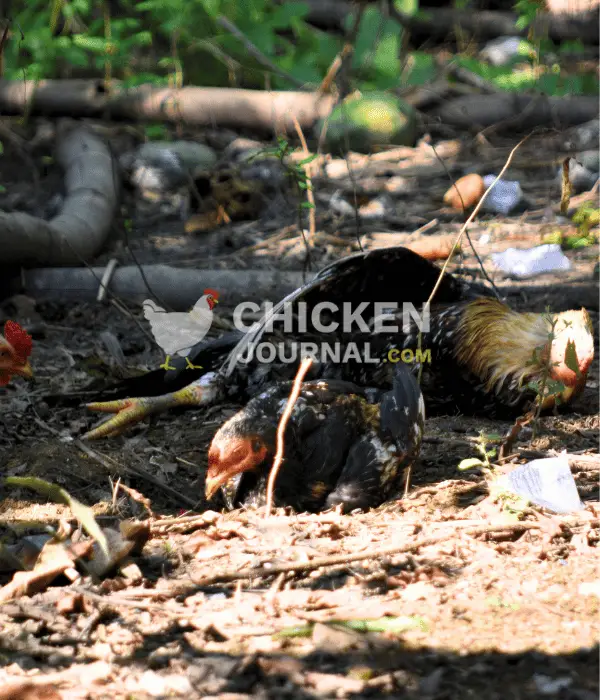
Reduced Egg Production
Studies have shown that stress can hurt chickens’ ability to produce eggs. Heat stress, in particular, is known to cause a decrease in egg production by inducing apoptosis (programmed cell death) of follicular cells.
The FasL/Fas and TNF-α systems are activated during this process, reducing the number of follicles.
In addition, stress can result in physiological alterations, behavioral changes, decreased egg and meat quality, tissue and intestinal damage, and high levels of corticotrophin-releasing hormone and corticosterone.
The endocrine system of the chickens is also affected by stress, with activation of the HPA axis and deactivation of the HPG axis. Therefore, managing stress is crucial to maintain healthy poultry and optimal egg production.
Decreased Immunity
The immune system of chickens can be negatively affected by stress, leading to decreased egg and meat quality, tissue, intestinal damage, and reduced disease resistance.
Chronic immune stress inhibits the body’s intestinal, cellular, and humoral immunities, resulting in decreased feed intake, slow growth, and adverse phenomena such as fever, depression, and anorexia.
Strategies for preventing and treating immune stress are necessary to avoid economic losses for farmers and the industry. Vaccinations protect livestock from infection but can stimulate immunity as a stress factor.
Poor Growth
Chickens are susceptible to stress, resulting in poor growth rates and reduced egg production. Even though early life stress can impact chicks’ weight and growth, they can still catch up by compensatory growth in a few weeks.
Additionally, stress can lead to symptoms such as weight loss, reduced egg production, and increased susceptibility to disease, ultimately resulting in increased production costs.
To combat anxiety, creating a stress-free environment for poultry involves controlling environmental influences, offering fresh water and nutritious food, and taking nutritional supplements to enhance digestion, absorption, and food consumption.
Feather Pecking and Cannibalism
Feather pecking and cannibalism are problematic behaviors in chickens under stressful conditions. It is a behavior where chickens peck at each other’s feathers, which can lead to the breaking off of parts of feathers.
This behavior is seen in socially stressed birds and can result in cannibalism, where chickens start physically attacking and harming each other. Overcrowding, improper nutrition, and environmental changes can trigger these behaviors.
Proper management practices, access to a well-balanced diet, and maintaining birds’ natural behavior can prevent these behaviors from occurring.
Keeping chickens in a healthy and stress-free environment is important to prevent feather pecking and cannibalization.
Decreased Fertility
Environmental stressors like heat stress can lead to decreased chicken production and reproduction. Maternal stress can also affect the behavior of offspring.
However, one study found that the progeny of stressed breeders exhibited higher resiliency to stressors than expected.
The adverse effects of stress on chicken fertility and productivity can be mitigated through dietary supplements, specifically vitamin combinations.
Signs and Symptoms of Stress in Chickens
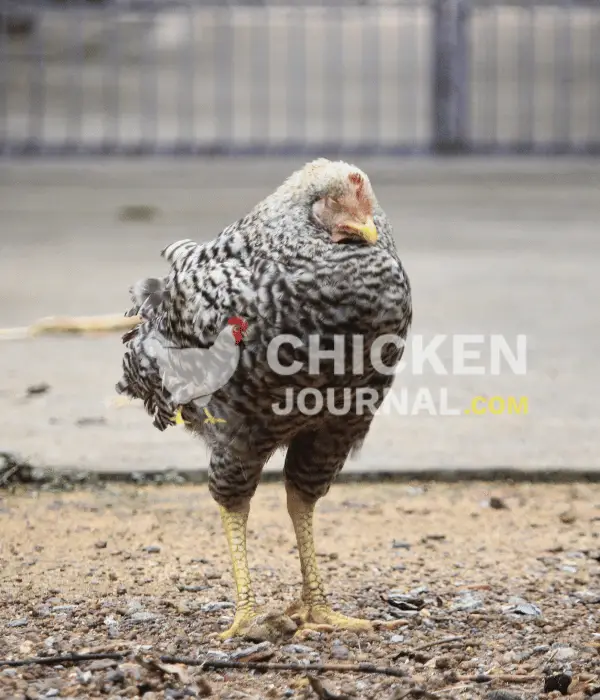
Decreased Appetite
Stressed chickens may eat less or stop eating altogether, leading to weight loss and declining overall health.
You have to keep an eye on your flocks so that you can see the signs of loss of appetite. Check the chicken feeder regularly to see whether the chicken is eating food or not.
If you see any signs of stress, ask your vet and separate the chicken to a different coop.
Lethargy
Chickens experiencing stress may become less active and spend more time resting or sleeping.
Lethargy can also be a symptom of various illnesses like Air Sac Disease, Aspergillosis, Avian Influenza, Botulism, Bumblefoot, Coccidiosis, and Fowl Pox.
If a chicken displays signs of lethargy, it’s crucial to consult a vet for an expert opinion on any health issues.
The chances of recovery can be increased by preventing the spread of the disease and treating it early on.
Aggression
Stressed chickens may exhibit aggressive behaviors, such as pecking or attacking other flock members.
Chicken aggression can cause stress and anxiety, leading to adverse health outcomes such as reduced egg production, decreased weight gain, and even death in extreme cases.
Chicken farmers need to be aware of the signs of aggression and take steps to prevent it from occurring to ensure the health and well-being of their birds.
Feather Loss
Stress can cause chickens to over-preen or pluck their feathers, leading to feather loss and bald patches.
Extreme stress can cause molt, while high-stress levels, in general, can also lead to feather loss.
Checking for red mites and vent gleet is essential and can be treated with Epsom salt baths in warm water. Enough space, boredom-busting activities and free feeding can solve these issues.
Changes in Vocalizations
Chickens experiencing stress may vocalize more frequently or exhibit changes in their normal vocalizations, such as increased volume or pitch.
Research has shown that chicken vocalizations can be used as reliable indicators of specific types of stress and that different vocalization patterns can be linked with particular stressful conditions.
When stressed, the “distress call” is a repetitive, high-energy vocalization young chickens make.
These stress vocalizations are connected to the level and type of stress that the bird is experiencing, which can be monitored non-invasively through sound analysis techniques.
The Impact of Environmental Factors on Chicken Stress Levels
Noise
According to a study, loud noise, precisely above 85 decibels, can cause stress and fear in chickens, leading to decreased feed intake of up to 25%.
Chickens have a circadian rhythm that can be disrupted by loud noise, causing stress, anxiety, lower egg production, and stunted growth.
When exposed to noise that could cause fear, chickens may exhibit behaviors such as perching flat on the ground or slumping into a corner.
Therefore, reducing the adverse effects of noise pollution on chickens is crucial, such as erecting sound barriers, avoiding repairs and renovations during rest hours, and training employees to respect the chickens’ sleep.
Light
A study investigating the effects of light wavelength on the behavior, welfare, stress, and production of chickens revealed that the wavelength of light significantly impacts the behavior, welfare, stress, and production of chickens.
LED lights, commonly used in layer production due to their energy efficiency and dimmability, have been found to affect laying hen production, fear, and stress.
Optimum light conditions are crucial in poultry farming, as too much light can cause stress to the birds.
However, including red light in the light spectrum has lowered stress susceptibility in laying hens. Additionally, research has shown that blue light can promote stress relief and growth in chickens.
Air Quality
The environmental quality of the air has a significant impact on the stress levels of chickens. Poor air quality can lead to respiratory issues in birds, which can cause stress.
Ammonia, released due to the decomposition of nitrogenous compounds in the litter, is one of the primary pollutants that can contribute to respiratory issues. Maintaining ammonia levels below 25 ppm is recommended for optimal broiler performance.
Aerosol particles in the air can also act as irritants to the respiratory system of the birds, leading to coughing and other respiratory issues.
In addition, exposure to excessive hydrogen sulfide (H2S) in the air can cause oxidative stress and energy metabolism dysfunction in chickens, leading to adverse health effects.
Therefore, maintaining good air quality through proper ventilation and litter management is crucial in reducing stress levels in chickens and promoting their overall health.
Temperature and Humidity
According to research, temperature and humidity conditions similarly affect stress response in laying hens.
Heat stress can reduce egg production and quality, and exposure to heat stress increases the secretion of corticosterone, a primary stress hormone in chickens.
The Temperature-Humidity Index (THI) chart assesses the stress levels of laying hens subjected to different THI zones.
Research has shown that temperature, but not RH, is the most crucial factor in heat stress that affects laying hens’ performance and physiology.
Laying hens experience heat stress above the optimal temperature, which can decrease their feed intake, laying performance, body weight, egg production, and quality and increase stress responses.
However, research demonstrated that high RH could deteriorate laying performance and egg quality and augment stress responses in laying hens. More studies are needed to find out how RH affects heat stress in chickens.
Weather Events
Extreme weather events, particularly heat waves, can significantly impact the stress levels of chickens. Heat stress can cause physiological changes, behavioral alterations, decreased egg and meat quality, tissue and intestinal damage, and high mortality rates in poultry.
The thyroid hormones, which regulate body temperature and metabolic activity, are also disrupted under high-temperature conditions.
Chickens utilize various mechanisms to maintain thermoregulation and homeostasis, including increasing heat loss and evaporative heat loss through panting. Genetic factors also affect the individual’s stress response to heat stress.
Animal welfare is a crucial factor in poultry farming, and providing an environment that ensures the birds’ freedom from disease, ability to perform specific behaviors, and ability to cope with social and environmental conditions is essential.
How To Prevent And Reduce Stress in Chickens?
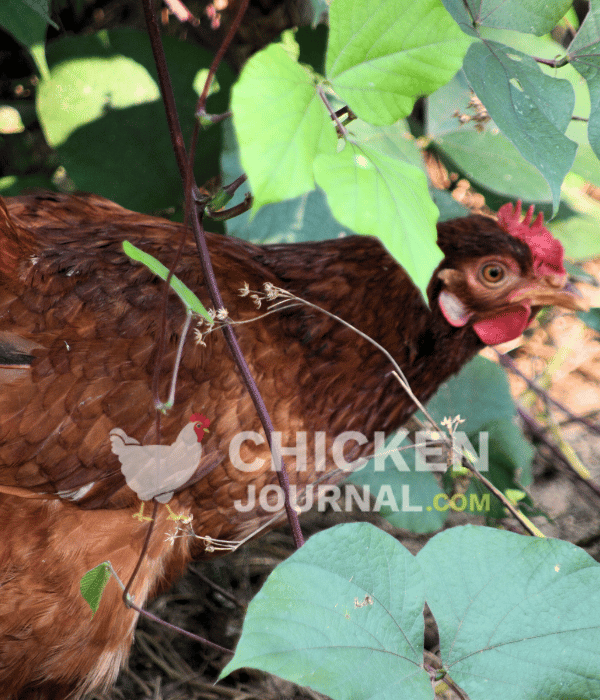
Here are a few measures to prevent and reduce stress in chickens:
1. Provide Adequate Space
Providing adequate space for chickens is crucial in reducing their stress levels. Overcrowding can lead to aggression, disease, and other negative behaviors.
To avoid this, ensure that each chicken has at least 4 square feet of space in the coop and 8-10 square feet in the yard. The coop should be well-ventilated and have enough roosting space for all chickens.
Additionally, provide plenty of food, water, and nesting boxes to keep them comfortable and happy. Reducing stress in chickens can lead to better egg production and overall health.
2. Maintain a Clean Environment
Keeping a clean environment in your backyard and chicken coop reduces stress in your poultry birds. Poultry birds, like chickens, are sensitive creatures, easily stressed by a dirty and cluttered environment.
To maintain a clean environment, you should clean the coop daily, remove debris, and ensure proper ventilation.
You should also regularly clean the waterer, feeder, and bedding. The health and well-being of your poultry birds will be promoted by taking these steps.
3. Offer a Balanced Diet
Providing your chickens with a nutritious diet is crucial for their well-being and can assist in alleviating tension. A healthy diet for chickens should include a mix of grains, protein, vitamins, and minerals.
You can provide your chickens with various foods, such as corn, wheat, soybean meal, fish meal, and oyster shells.
Additionally, you can give them fresh fruits and vegetables. Remember to provide plenty of clean water as well. A well-fed, happy, healthy chicken can help reduce stress and lead to better egg production.
4. Control Environmental Factors
Environmental factors such as living conditions, climate, and nutrition can contribute to poultry stress.
Heat stress is a common problem in chickens, which can be managed by providing proper ventilation, adjusting feeding schedules, and flushing and cooling waterers.
Electrolytes and vitamins can also be added to drinking water to help birds cope with heat stress. Supplementing vitamins can also help combat environmental stressors in chickens.
To minimize stress, it is crucial to maintain a clean and calm environment, avoid startling noises or extreme heat, and provide access to clean water and pelleted feed.
5. Monitor Flock Health
Monitoring the health of your flock is crucial to minimizing stress in chickens. Stress can affect egg production, growth, and overall well-being.
To ensure the health of your flock, it is essential to observe their behavior and physical appearance regularly. Look for signs of illness such as lethargy, loss of appetite, or abnormal droppings.
Keep the coop clean, dry, and well-ventilated to prevent the spread of disease. Provide fresh water and a balanced diet to ensure proper nutrition.
Regularly inspect birds for parasites and treat them as necessary. By monitoring and maintaining the health of your flock, you can ensure happy and productive chickens.
6. Provide Enrichment
Enrichment can help reduce stress in chickens by providing them with outlets for natural behaviors such as foraging, dust bathing, and perching.
This can include adding straw bales for pecking and scratching, providing opportunities for dust bathing through sand or other substrates, and adding perches or platforms for chickens to roost on.
Additionally, environmental stimuli like chicken toys or mirrors can help reduce stress by allowing chickens to express natural behaviors.
Ensuring proper lighting, ventilation, and temperature control can help keep chickens comfortable and reduce stress.
7. Create a Safe Environment
Creating a safe and predator-free area is crucial in reducing stress in chickens. The first step is to make sure that the coop is safe and free of predators.
This can be achieved using sturdy fencing materials and installing locks on all coop doors and windows.
Providing adequate space for the chickens to move around freely is also essential. This can be achieved by building a run or enclosure that is spacious enough for the chickens to move around and engage in natural behaviors.
Overall, creating a safe and predator-free environment for chickens reduces stress and promotes their health and productivity.
8. Introduce New Birds Gradually
Introducing new birds gradually in flocks is an excellent way to reduce stress in chickens. This process involves adding a few new birds to the existing flock instead of introducing all the birds simultaneously.
This allows the birds to gradually get used to each other’s presence, reducing the likelihood of aggression and stress. Providing enough space, food, and water for all the birds is significant to prevent competition and ensure their well-being.
Additionally, monitoring the birds closely during this process can help promptly identify and address any issues.
9. Implement Routine
To ensure the well-being of your chickens, it’s essential to establish a routine that includes feeding, cleaning, and interacting with them. This will reduce stress in your flocks and lead to healthy and happy chickens.
Here’s a routine you can implement:
- Feeding: Feed your chickens simultaneously daily and ensure they can access clean water. You can provide them with a balanced chicken feed and supplement it with fresh fruits and vegetables. Keep their feeding area clean and free of moldy or spoiled food.
- Cleaning: Regularly clean your chicken coop to prevent the buildup of bacteria and parasites. Remove any manure or soiled bedding and replace it with fresh material. You can also sprinkle food-grade diatomaceous earth in the coop to control pests.
- Interacting: Chickens are social animals and enjoy human interaction. Spend time with them by sitting in their coop or running and talking to them. Offer them treats by hand and gently stroke their feathers. This approach will enhance their familiarity with you and reduce their stress level.
Implementing this routine creates a comfortable and predictable environment for your chickens, leading to happier, healthier flocks.
10. Provide Shade and Cool Water
Chickens can quickly become stressed during hot summer months, leading to decreased egg production, poor health, and even death.
To help reduce stress, providing shade and cool water is essential. Chickens should have access to a shaded area during the hottest parts of the day. This can be provided by trees, umbrellas, or even a specially designed chicken coop run.
Additionally, cool water should be available at all times. Poultry waterers should be placed in shaded areas to help keep the water cool. You can also add ice cubes to the water to help keep it cool.
How to Reduce Heat Stress in Poultry Birds?
Heat stress can be a significant issue for poultry birds, especially in hot and humid weather conditions.
High temperatures can cause various problems in birds, including reduced egg production, lower feed intake, and even death in severe cases. Here are some tips to help reduce heat stress in poultry birds:
- Provide access to clean water: Birds always need access to cool and clean water. Make sure to check water sources regularly to ensure that they are not contaminated or too warm.
- Provide Shade: Shade should be provided during the hottest periods of the day to facilitate bird movement. Consider adding structures like awnings or trees to provide shade.
- Increase ventilation: Good ventilation is essential for reducing heat stress in birds. Ensure the coop or housing structure is well-ventilated to allow air to circulate.
- Adjust feeding schedules: Consider feeding birds during the more excellent parts of the day to avoid heat stress during feeding time.
- Use fans and misters: Chicken coop fans and misters can help to cool the air and reduce heat stress in birds. Install fans and misters in the coop or housing structure to help keep birds cool.
Other FAQs
How Much Heat Stress Can Chickens Tolerate?
Temperatures exceeding 90 degrees Fahrenheit (32.22 °C) increase the risk of heat stress and heat-related illness in chickens, including death.
Chickens cannot cool themselves by sweating, and they dissipate excess heat from their combs, wattles, beaks, and feet.
Chickens can show signs of heat stress and stroke, including panting, standing with wings held away from the body, droopy and lethargic behavior, decreased appetite, pale or discolored combs and wattles, and decreased egg production.
It is essential to provide shade, cold fresh water, and the proper cold treats while monitoring them for signs of heat stress to prevent this from happening.
Overheating can result in heat stroke, heat-induced stress, and death in chickens. Therefore, ensuring chickens are kept cool during hot weather is crucial.
How to Treat Heat Exhaustion in Chickens?
Heat exhaustion in chickens can be a severe issue; if not treated promptly, it can lead to death. The best way to treat heat exhaustion in chickens is to move them to a coop, a shaded area with plenty of clean water.
You can also use fans or misters to cool the surrounding air. It’s essential to monitor them closely and ensure they drink water regularly.
Electrolytes can be added to their water to help rehydrate them. If the symptoms persist, it’s best to consult a veterinarian for further treatment.
Can Chickens Recover From Stress?
Chickens can recover from stress, but it’s important to find and fix the source of the stress to stop it from happening again. Stress can compromise chickens’ health and reduce egg production.
Mishandling and introducing new chickens can cause stress. Providing enough space for the chickens to perch, nest, and roam can help reduce their stress.
Enrichment activities like homemade chicken piñatas and swings can also alleviate boredom and reduce stress. Lavender can be used to relax chickens. However, extreme stress may even lead to a heart attack and death in chickens.
Conclusion
Stress in chickens can significantly impact their overall health and productivity. By understanding the types and causes of stress in chickens and implementing effective strategies to minimize stress, you can ensure your flock’s well-being and stress reduction.
Providing a clean and safe environment, a balanced diet, and access to enrichment and supplements can help prevent and reduce stress in your chickens, promoting optimal health and productivity.


Leave a Reply